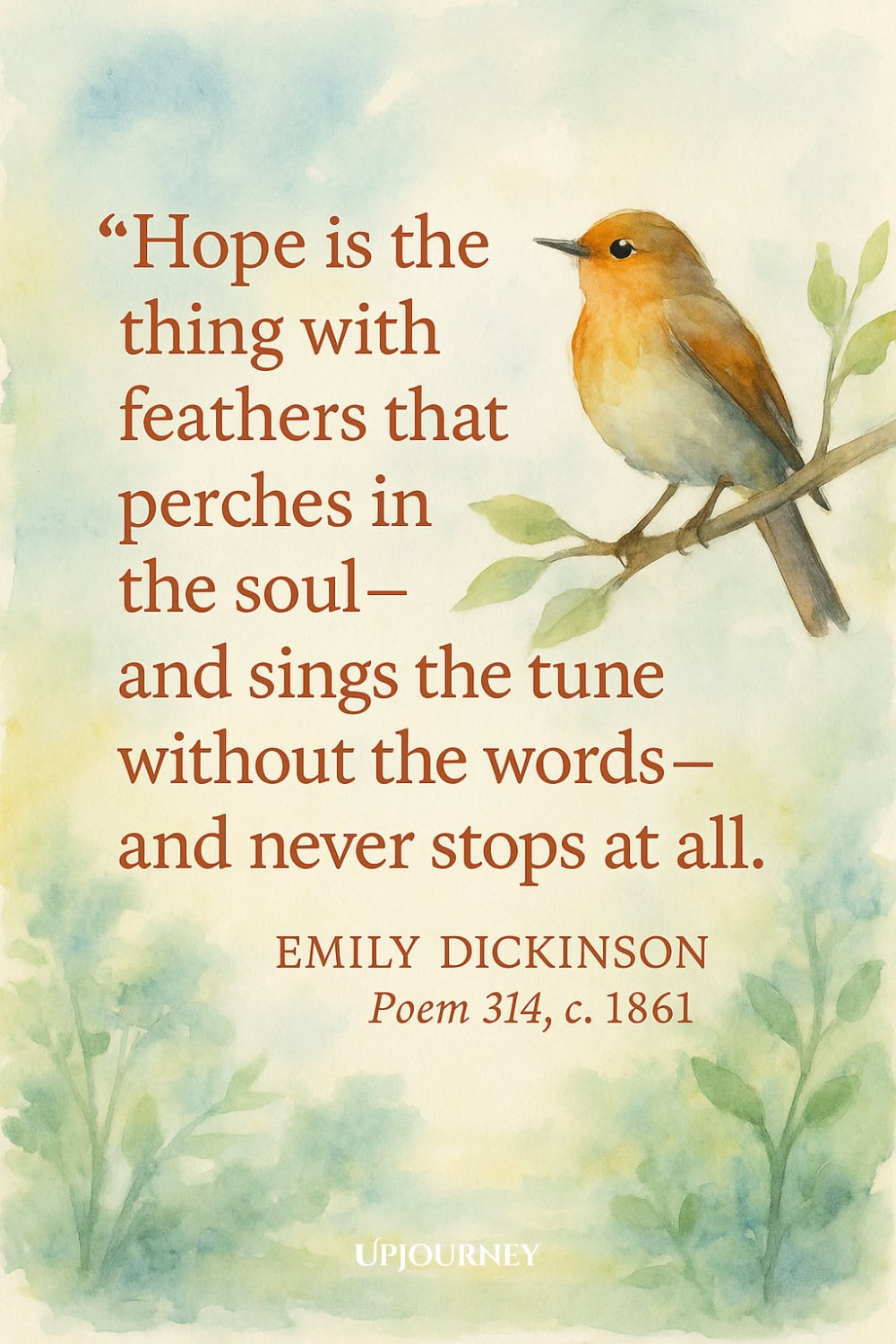Emily Dickinson (1830–1886) remains one of the most fascinating and cherished figures in American literature. Born into a prominent Massachusetts family, she defied societal expectations—not through rebellion, but through retreat. While the world bustled outside, Dickinson found meaning in silence, solitude, and the written word.
Often misunderstood by those around her and labeled eccentric for her reclusive lifestyle, Dickinson was quietly crafting a legacy that would outlast her time. During her lifetime, she published only a few poems. Yet after her death, nearly 1,800 of her verses emerged—startling in their depth, innovation, and emotional intensity.
Her poetry, filled with themes of hope, death, love, nature, and the human spirit, continues to captivate readers across generations. In this article, we explore Emily Dickinson’s most powerful and thought-provoking quotes.
Whether you’re meeting her for the first time or rediscovering a favorite poet, you’ll find her words echoing truths that feel both intimate and eternal.
Fun Fact: Emily Dickinson often baked her own bread and even sent poems to friends wrapped around homemade gingerbread.
Table of Contents
Famous Emily Dickinson Quotes
These are the lines that have become synonymous with Dickinson’s poetic genius. Each continues to inspire, comfort, and provoke thought over a century after she wrote them.
Hope is the thing with feathers that perches in the soul—and sings the tune without the words—and never stops at all.
— from Poem 314, c. 1861
Dickinson captures the endurance and resilience of hope in this unforgettable metaphor. The image of hope as a persistent bird brings comfort to readers in all walks of life.

Forever is composed of nows.
— from Poem 690, c. 1863
With just four words, Dickinson encourages us to appreciate the present, reminding us that eternity is made up of today’s moments.
I dwell in possibility.
— from Poem 657
Dickinson celebrates the boundless opportunities of imagination and creativity, a theme that recurs throughout her work.
Emily Dickinson Quotes on Hope
Hope is a thread running through much of Dickinson’s poetry, often depicted as a quiet, powerful force within us.
Not knowing when the dawn will come, I open every door.
— from Poem 1579
Dickinson’s curiosity and faith in the future shine through—she encourages us to remain open and expectant, even in uncertainty.

We never know how high we are till we are called to rise.
— from Poem 1176
This line is a reminder of the strength and potential that can emerge when we are tested by life’s challenges.
Emily Dickinson Quotes on Death and Immortality
Dickinson’s fascination with mortality is evident throughout her poetry, where she explores the mysteries of life, death, and what lies beyond.
Because I could not stop for Death – He kindly stopped for me.
— from Poem 479
Here, Death is personified as a gentle guide rather than a force to be feared, a perspective unique in American poetry.
Parting is all we know of heaven, and all we need of hell.
— from Poem 1732
This poignant line speaks to the bittersweet nature of goodbyes and the pain of separation.
I heard a Fly buzz—when I died—
— from Poem 465
Dickinson uses ordinary details to convey the strangeness and stillness at the edge of life.
Emily Dickinson Quotes on Love
Love in Dickinson’s poetry is both tender and mysterious, sometimes joyful, sometimes tinged with longing.
That love is all there is, is all we know of love.
— from Poem 1765
Dickinson’s reflections on love are at once simple and profound—sometimes love just is, and that is enough.

Unable are the loved to die, for love is immortality.
— from Poem 809
Through love, Dickinson suggests, we transcend loss and find a kind of eternity.
Morning without you is a dwindled dawn.
— from a letter to Susan Gilbert Dickinson
This line, addressed to her close friend and sister-in-law, expresses longing and affection in true Dickinson style.
Emily Dickinson Quotes on Life and Self-Discovery
Dickinson’s poems encourage us to question, to grow, and to discover who we are.
The soul should always stand ajar, ready to welcome the ecstatic experience.
— from a letter to T.W. Higginson, 1870
Dickinson urges us to keep our hearts and minds open to the wonders of existence.
If I can stop one heart from breaking, I shall not live in vain.
— from Poem 919
For Dickinson, even a small act of kindness is a life well-lived.
Find ecstasy in life; the mere sense of living is joy enough.
— from a letter to T.W. Higginson, 1870
She reminds us that there is beauty and meaning in simply being alive.
Emily Dickinson Quotes on Nature and Creativity
Nature, for Dickinson, is a source of inspiration, beauty, and solace. Her creativity was deeply intertwined with her love for the natural world.
A light exists in spring not present on the year at any other period.
— from Poem 812
Dickinson’s observations of nature reveal both its beauty and its fleetingness.
To make a prairie it takes a clover and one bee, One clover, and a bee, And revery. The revery alone will do, If bees are few.
— from Poem 1755
Here, Dickinson celebrates the power of imagination—nature can be created in the mind as well as in the world.
The earth is just a little lower than the sky.
— from Poem 381
Nature, for Dickinson, is a constant source of wonder and reflection.
The Last Stanza
Emily Dickinson’s poetry endures because it speaks to the universal experiences of hope, love, loss, and wonder. Her words continue to comfort, challenge, and inspire new generations of readers. We hope these quotes help you find meaning, beauty, and courage in your own journey.